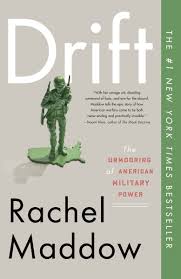Drift by Rachel Maddow **** (of 4)
Rachel Maddow's thesis is elegantly simple: the Founding Fathers feared that the President of the United States and commander in chief of the armed forces needed to be constrained, lest the power to deploy troops be taken too lightly. To prevent a President from ordering the military into war too easily, the founders invested Congress with the requirement to approve the initiation and funding of any war.
Moreover, Maddow argues, the Founding Fathers constructed the army of citizen soldiers thereby making the decision to launch a war one that would necessarily involve a national debate. Everyone would be related to a soldier and everyone would have to decide if his life was worth risking.
Drift describes the post WWII slide into wars and proxy wars led by Presidents circumventing Congress and in recent years even side-stepping the U.S. Army altogether. America has fought in Grenada, Panama, and Bosnia without declarations of war. It has fought in Afghanistan and Iraq for decades without much public debate, sending reserves and national guardsmen on multiple tours of duty to make their wars feasible. Drones now kill enemy combatants and unknown numbers of civilians around the world with the command of the President without the public being aware. And private contractors now perform a lion's share of military work outside of Congressional oversight.
Maddow's speedy and wonderfully snarky approach makes this an easy read. If you have a chance, listen to the book, she narrates the audio version -- it's like her show, only tightly edited and without the repetitiveness she uses to fill time on the air. Some arguments to the contrary are too quickly brushed aside. The military should have intervened to prevent Serbs from committing genocide on Bosnians far sooner than it did. Some drone attacks are probably effective at preventing deadly terrorist attacks. Why didn't we intervene in Rwanda?
Still, Maddow's incomparable intelligence is on full display. She is a rightful heir to Howard Zinn and his seminal, A People's History of the United States.
Moreover, Maddow argues, the Founding Fathers constructed the army of citizen soldiers thereby making the decision to launch a war one that would necessarily involve a national debate. Everyone would be related to a soldier and everyone would have to decide if his life was worth risking.
Drift describes the post WWII slide into wars and proxy wars led by Presidents circumventing Congress and in recent years even side-stepping the U.S. Army altogether. America has fought in Grenada, Panama, and Bosnia without declarations of war. It has fought in Afghanistan and Iraq for decades without much public debate, sending reserves and national guardsmen on multiple tours of duty to make their wars feasible. Drones now kill enemy combatants and unknown numbers of civilians around the world with the command of the President without the public being aware. And private contractors now perform a lion's share of military work outside of Congressional oversight.
Maddow's speedy and wonderfully snarky approach makes this an easy read. If you have a chance, listen to the book, she narrates the audio version -- it's like her show, only tightly edited and without the repetitiveness she uses to fill time on the air. Some arguments to the contrary are too quickly brushed aside. The military should have intervened to prevent Serbs from committing genocide on Bosnians far sooner than it did. Some drone attacks are probably effective at preventing deadly terrorist attacks. Why didn't we intervene in Rwanda?
Still, Maddow's incomparable intelligence is on full display. She is a rightful heir to Howard Zinn and his seminal, A People's History of the United States.

Comments
Post a Comment